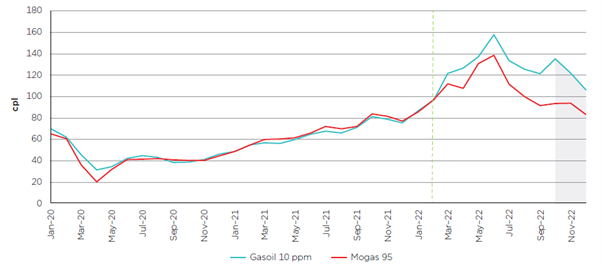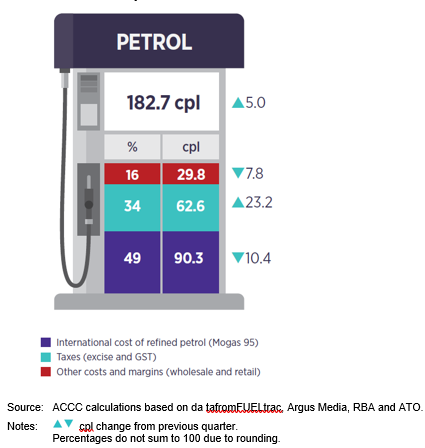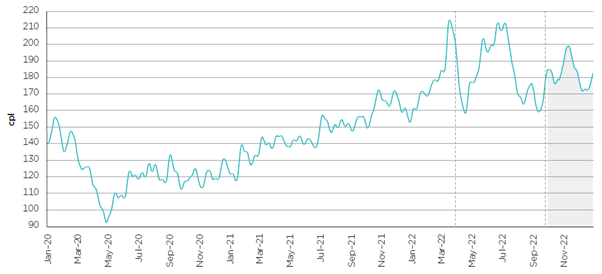Petrol prices increased slightly and diesel prices remained significantly higher than petrol prices in the December quarter 2022, according to the ACCC’s .
Quarterly average retail petrol prices in the five largest cities (Sydney, Melbourne, Brisbane, Adelaide and Perth) were 182.7 cents per litre (cpl), an increase of 5.0 cpl from the September quarter 2022. Average retail diesel prices were 222.9 cpl in the quarter, more than 40.0 cpl higher than average petrol prices.
“Our report shows a range of international factors contributed to higher retail diesel prices in Australia,” ACCC Chair Gina Cass-Gottlieb said.
“The small increase in average retail petrol prices in the major cities reflects the increase in taxes following the restoration of the full rate of excise from 29 September 2022, offset by a decline in international petrol prices.”
Diesel prices exceeded petrol prices due to higher international prices
The report shows that retail diesel prices continued to exceed petrol prices in the quarter due to the higher international refined diesel prices since the Russian invasion of Ukraine.
Reduced supplies of diesel from Russia, and from France due to refinery strikes, combined with increased demand for heating in the northern hemisphere winter kept diesel prices high.
Retail fuel prices in Australia are largely determined by international refined fuel prices, which are influenced by international crude oil prices, and the AUD-USD exchange rate. The following chart shows average international refined diesel prices (Gasoil 10 ppm prices) and international refined petrol prices (Mogas 95), in Australian cents per litre.
Monthly average Gasoil 10 ppm and Mogas 95 prices in nominal terms: January 2020

Source: ACCC calculations based on data from Argus Media and the Reserve Bank of Australia (RBA).
Notes: The shaded area in the chart represents the December quarter 2022.
The green dotted line indicates when the Russian invasion of Ukraine began (20 February 2022).
“Russia’s invasion of Ukraine led to international diesel prices moving higher than petrol in early 2022. While international refined fuel prices reduced in the December quarter, the difference between the diesel and petrol benchmarks continued,” Ms Cass-Gottlieb said.
The increase in average petrol prices largely reflected the restoration of full excise
Petrol and diesel excise was halved in March 2022. When the excise cut ceased from 29 September, the rate of excise increased from 23.0 cpl to 46.0 cpl.
Changes in the three broad components of average retail petrol prices in the major cities largely reflect the increase in taxes (that is, both excise and GST) following the excise restoration.
Quarterly average changes in the components of retail petrol prices in the five largest cities: December quarter 2022

Crude oil prices continued to decrease in the December quarter amid concerns about a potential global recession, rising interest rates and lower demand.
“Despite lower international prices, the influence of the fully restored fuel excise and a lower AUD-USD exchange rate meant overall that average retail petrol prices across the largest cities were slightly higher than in the previous quarter,” Ms Cass-Gottlieb said.
The following chart shows movements in seven-day rolling average retail petrol prices in the five largest capital cities from 1 January 2020 to 31 December 2022. The chart also indicates when fuel excise was cut from 30 March 2022, and when it was restored from 29 September 2022.
Seven-day rolling average retail petrol prices in the five largest cities in nominal terms: 1 January 2020 to 31 December 2022 – cpl

Source: ACCC calculations based on data from FUELtrac.
Notes: The shaded area in the chart represents the December quarter 2022.
The 2 dotted lines indicate the cut in fuel excise from 30 March 2022 and the restoration of full excise from 29 September 2022.
Among the five largest capitals, average retail petrol prices were highest this quarter in Melbourne (185.2 cpl) and lowest in Adelaide (178.9 cpl). In the smaller capital cities, average retail petrol prices decreased in Canberra and Darwin by 7.4 cpl and 7.6 cpl, respectively, and increased in Hobart by 2.8 cpl.
Average petrol prices across the 190 regional locations the ACCC monitors were 187.0 cpl, an increase of 0.1 cpl from the September quarter 2022. Average regional prices were 4.3 cpl higher than average prices in the five largest cities, compared with 9.2 cpl higher in the September quarter.
Greater fuel price transparency welcomed in two jurisdictions
In November 2022, the NSW fuel price transparency scheme (FuelCheck) was expanded to include retail sites in the ACT as part of a six-month pilot. The Northern Territory Government also announced it would start publishing historical fuel price data to help motorists find outlets which have the lowest prices over time.
“The ACCC has long supported fuel price transparency schemes, so it is pleasing to see more motorists having access to real-time and comprehensive price information to help them save money on fuel,” Ms Cass-Gottlieb said.
Victoria is now the only jurisdiction in Australia without a real-time and comprehensive fuel price transparency scheme.
Note
‘Petrol’ means regular unleaded petrol (RULP) unless otherwise specified.
Singapore Mogas 95 Unleaded (Mogas 95) is the relevant international benchmark for the wholesale price of petrol in Australia. Singapore Gasoil with 10 parts per million sulphur content (Gasoil 10 ppm) is the international benchmark for the wholesale price of diesel.
The ACCC uses a seven-day rolling average basis to analyse movements in daily retail petrol prices. A seven-day rolling average price is the average of the current day’s price and prices on the six previous days.
Background
The ACCC has been monitoring retail prices in all capital cities and over 190 regional locations across Australia since 2007.
On 14 December 2022, the Treasurer issued a new direction to the ACCC to monitor the prices, costs and profits relating to the supply of petroleum products in the petroleum industry in Australia and produce a report every quarter for a further three years. This is the ACCC’s first quarterly petrol monitoring under the new direction.






